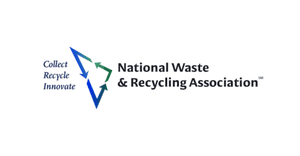The Effects of COVID-19 — and Future Outlook — on U.S. Recycling Programs

be Waste Wise hosted a webinar on “Pandemic Effects on U.S. Recycling Budgets,” featuring Vita Quinn of SCS Engineers and Vincent Leray of The Recycling Partnership — in conversation with Cole Rosengren, senior editor, Waste Dive. The discussion covered COVID-related trends in residential recycling programs, as well as potential solutions being explored by municipalities to maintain their programs.
In this era of increasing fees and changing contract structures, coupled with the challenges of this year’s pandemic, the speakers first acknowledged a need to step back and look at high-level causes and effects—and to not act rashly in making short-term programmatic decisions that could have far-reaching, long-term effects.
Quinn observed that there seems to be a “conversation shift” afoot, and a recognition that there’s “only so much you can do to address challenges” before the discussion gets into revenue impacts or operational changes. For instance, a provider might ask, “What happens if we cut down the frequency of our solid-waste service?” And, “Where are the costs of our services, and are we recovering those from the right places?” This is all part of a larger and evolving financial conversation about “how much recycling should cost, who should pay, and whether it should be a revenue operation or expense.”
Leray touched on the consumer viewpoint and noted that, “a big change that a lot of folks are coming to understand is that recycling is not free,” and communities are readjusting budgets accordingly. As residents have to pay more for recycling, they come to view it as more of a service for which they have specific expectations such as its on-time operation. In many U.S. communities, Leray notes that there is perhaps a need for “realigning residents’ expectations.”
Quinn also acknowledged that, “Recycling has to be a true service; it has to justify the additional costs.” She pointed out that it would, of course, be less expensive and less hassle to take recycling straight to the landfill.
Rosengren asked the panelists what other factors — whether financial or related to sustainability or other goals — are municipalities considering for why they are keeping recycling programs. Leray observed that, in a lot of places, there has been a recent move toward a “longer view of sustainability.” This includes notions such as preserving landfill space for a city 25 years from now. Leray also noted discussions around a movement toward “sustainable regions.” A small community, for instance, might not want to be the proverbial black sheep when it comes to recycling and sustainability in a regional area. In many cases, residents have come to expect these types of programs. And, yes, “you might have to raise rates” in order to provide them.
Quinn elaborated on this idea by saying that, “If you cancel a program, the issues around recyclables doesn’t go away.” Agreed Leray, “The amount of material doesn’t change. So you’re always going to be managing that… With or without a recycling program, people are using cans, recyclable containers, etc.”
One hurdle for many municipalities is that it “takes money to make your program more efficient.” And, while “nobody wants to raise taxes or fees on the average resident,” Quinn advised that it is necessary to shift from an expense-based to revenue-based approach. Creative ways to help do this can include grant programs, maximizing permitting fees, and identifying and leveraging interdepartmental dependencies.
Municipalities should also ask themselves, “What are we doing that’s a waste of time?” For instance, should a brush truck drive around the whole city once a week, or would it be better if this service were provided on call? The speakers discussed the merits of reducing the frequency of recycling services in order to preserve a program.
Commercial recycling trends and suggestions were also discussed. Quinn emphasized that providers really need to look at the cost of service and how to make that work. In the past, they may have provided discounts for recycling, or free dumpsters along with solid waste services. But does that still make sense? Leray advised that both providers and customers should ensure that their dumpsters and service levels are right-sized. “Be cognizant and reach out to your provider” about this, because it doesn’t make sense to pay for unused services. He encouraged customers to ask, “Do I need weekly pickup?” Because, “if your recyclables are appropriately cleaned and sorted, they can wait longer.”
The conversation wrapped up with questions from the audience and touched on topics including whether contracts should include new language that allow for unforeseen challenges such as a pandemic; extended producer responsibility; reducing contamination, and more.
For closing thoughts, the speakers offered a few takeaways regarding the most important things municipalities should be thinking about at this time. Leray reminded the audience that, “pausing or canceling a program can be cost prohibitive” and to consider “how much are you willing to reeducate residents — it’s a hard thing to restart and recover.” Also, “building trust in recycling programs is important — and that’s hard to build back.” Finally, “avail yourself of resources from organizations such as The Recycling Partnership.”
Quinn advised listeners to do a cost-benefit analysis. If you get rid of a program, “what are your fixed costs? Are you really getting rid of equipment?” She noted that, “the savings are often not the cost of the program.” And, think about the “barriers to reentry if you change your mind in a few years. It makes a lot more sense to reduce frequency of collection during a difficult time.”
About the Author
You May Also Like




